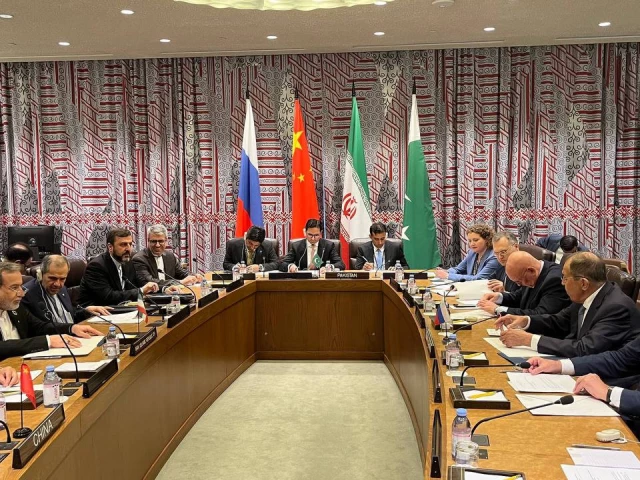Pakistan, China, Iran and Russia expressed deep concerns about the growing security threats in Afghanistan, particularly the continuous presence of terrorist groups that operate from the Afghan soil and emphasized the urgent need for regional cooperation to address the growing instability.
The fourth quadripartite meeting of foreign ministers, met outside the 80th General Assembly of the United Nations, focused on the terrible security situation, the ongoing humanitarian crisis and the economic recovery of the country.
In a joint statement issued at the end of the meeting, the four parties reiterated their support for the sovereignty of Afghanistan, asking the nation to remain independent, united and free from the threats of terrorism, war and narcotics.
Countries emphasized the urgency of regional collaboration to stabilize Afghanistan, citing the significant risks raised by the terrorist groups operating from the Afghan soil.
Joint declaration of the fourth quadrifartite meeting of foreign ministers of China, Iran, Pakistan and Russia, held apart from Unga in New York on September 25, 2025. pic.twitter.com/fxgdggiTu
– Mohammad Sadiq (@ambassadorsadiq) September 26, 2025
“The four parties expressed a deep concern for the security situation related to terrorism in Afghanistan,” said the statement, “particularly the continuous presence of terrorist groups such as Isil, Al-Qaeda, Tehrik-i-Taliban Pakistan and the Islamic movement of the east of Turkestan, among others.” These groups, the ministers said, represent a serious threat not only for Afghanistan but also for global security.
The representatives stressed the importance of effective measures against terrorism, urging the Afghan authorities to fulfill their international obligations dismantling and eliminating terrorist groups.
“We make the Afghan authorities take effective, concrete and verifiable actions to combat terrorism,” said the declaration, “including the prevention of recruitment, collection of funds and access to weapons, and dismantling terrorist training camps on Afghan soil.”
In addition to security, the four parties discussed the economic recovery of Afghanistan, with a particular approach in combating the increase in synthetic drugs and facilitating the return of Afghan refugees. The ministers expressed their support for the measures aimed at reducing opium cultivation and combating drug trafficking.
“The four parts praise the efforts of the Afghan authorities to reduce the cultivation of traditional opium,” said the joint statement, asking for comprehensive measures to combat the production of methamphetamines and other synthetic drugs.
They also urged greater international support for Afghanistan, especially in terms of humanitarian assistance. “We call on the international community that intensify emergency humanitarian aid for the Afghan people,” said the statement, emphasizing the need to provide support without attached political conditions.
The four countries reiterated the importance of an inclusive governance system in Afghanistan that reflects the needs of all ethnic and religious groups, with a particular approach in guaranteeing women’s rights to education, employment and participation in public life. “Women’s access to education, economic opportunities and basic services is essential for the stability and prosperity of Afghanistan,” said the statement.
Read: The prime minister is a historical response to Indian aggression, demands peace and dialogue in the Unga session
The role of NATO in the current situation of Afghanistan was also discussed during the meeting, since the ministers pointed out that NATO members have the main responsibility of the current crisis and urged them to lift the sanctions to Afghanistan and return the assets abroad in the country.
“NATO members should create opportunities for the recovery and economic development of Afghanistan,” they said, advocating a holistic approach to the reconstruction of the nation.
Foreign ministers also requested better anti -terrorism cooperation at bilateral and multilateral levels. They emphasized that Afghanistan should be supported by taking comprehensive measures to combat terrorism and avoid the use of their territory against their neighbors and beyond.
“The sovereignty, independence and territorial integrity of Afghanistan must be respected,” the statement concluded, opposing the restoration of military bases in and around the country by those responsible for their current situation.
The meeting was a significant step to strengthen regional cooperation in Afghanistan, and ministers recognized the continuous efforts of regional countries, particularly Pakistan and Iran, organizing millions of Afghan refugees. The four parties expressed their commitment to continuous collaboration to help Afghanistan recover from decades of conflict and instability.
Finally, the ministers expressed their support for diplomatic efforts aimed at solving the political problems of Afghanistan. “We emphasize the role of regional frameworks such as the Moscow format and the Shanghai cooperation organization to facilitate a political agreement,” said the statement, hosting the recent discussions in Dushanbe, Tayikistan, and encouraging the continuation of quadrilateral consultations on the future of Afghanistan.




